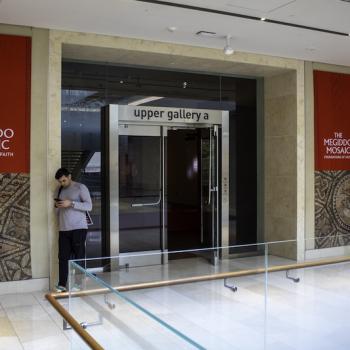Some progressive evangelical leaders like Tony Campolo, Shane Claiborne, Ron Sider, and Jim Wallis, who hold traditional views about marriage and ordained clergy remain committed to eradicating poverty and other very noble social justice causes. They fought gallantly to rescue the word "evangelical" from the clutches of their more conservative brethren. Yet, they continue to champion themselves as "progressives" even though, as Sarah Posner wisely noted over at Religion Dispatches, their brand of progressivism no longer speaks for many people of faith.
Yes, I understand that some progressive evangelicals have theological reservations when it comes to "homosexuality." As a direct descendant of Roger Williams, I do not wish to force anyone to go against their conscience by forcing them to endorse a given cause.
So, rather than continuing to battle each other over this issue, I'd like to propose a compromise. Why not designate those "progressive evangelicals" who do not feel called to champion LGBT rights as "traditionalist progressives"? (The term "conservative progressive" appears to be quite the oxymoron.) That will distinguish them from those religious progressives from mainline and spiritual but not religious circles who are advocating for women's rights and full inclusion of LGBT people. Such a distinction will allow for funders and followers to have a clearer scope of the organization's mission, so they can ascertain if this ministry is in line with their values. Also, this shift would be a start toward educating the media and the public at large about the growing multicultural nature of religious progressivism.
I know from private conversations that some progressives feel in their heart that they want to speak out in favor of LGBT rights but they remain fearful they will lose their sacred place on the Christian author/speaker circuit, get kicked out of their pulpit, and other real concerns especially given this ongoing economic crisis. To those people, I think they may find some inspiration from some of the foot soldiers I've met in my travels. I capture some of their stories in my forthcoming book with Seabury Press. In my exploration of Episcopal Churches working in the margins, I discovered radically welcoming communities that were often led by women, with about half of these ministries led by women of color. These spaces where all could be welcomed including LGBT people, give me considerable hope that the church can remain vibrant and relevant in the 21st century if communities can learn how to live out the baptismal covenant to "welcome all" into their midst.
My hippie-dippy inner child can hear the stirrings of Bob Dylan in the background that tells me, yes, we are on the cusp of a new era with LGBT rights emerging as the civil rights issue for the 21st century. I haven't even begun to address the lack of support in too many church circles for the basic rights of the bi and trans communities, two groups often discriminated against even in gay and lesbian circles. So we're just at the beginning of what looks to be a long rainbow ride ahead.
So, in conclusion, John isn't blowing in the wind. Rather he's echoing the direction where I truly believe the spirit is blowing. Like John, I predict that within the next decade those churches that are still battling over LGBT rights will resemble those recalcitrant WWII era Japanese soldiers living amongst the mangrove trees of Lubang Island long after everyone else has accepted peace as a fact and adjusted to the new world order.




